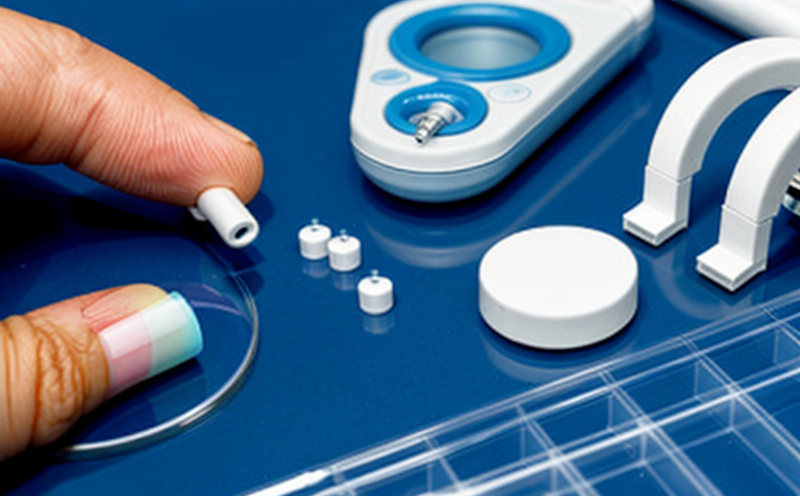Assessing the compatibility of materials with human tissues in medical devices
The Crucial Step in Medical Device Development Assessing Material Compatibility with Human Tissues
In the ever-evolving landscape of medical device development, ensuring that materials used in these devices are compatible with human tissues is an essential aspect to consider. As businesses strive to create innovative and safe products for patients, they must prioritize this critical step to avoid costly recalls, reputational damage, and most importantly, harm to users.
What is Material Compatibility Testing?
Material compatibility testing involves evaluating the interaction between medical device materials and human tissues, such as skin, muscles, bones, or other body parts. This comprehensive assessment helps manufacturers determine whether their products can be safely used in medical settings without causing adverse reactions or complications.
At Eurolab, our team of experts provides a state-of-the-art laboratory service for assessing material compatibility with human tissues in medical devices. Our cutting-edge technology and rigorous testing protocols ensure that clients receive accurate, reliable results to support the development of safe and effective products.
Why is Material Compatibility Testing Essential?
The importance of material compatibility testing cannot be overstated. Some of the key reasons why this step is crucial include
Prevents Adverse Reactions Incompatible materials can cause allergic reactions, inflammation, or even infections in patients. By identifying potential issues early on, manufacturers can modify their designs to ensure user safety.
Avoids Product Recalls Companies that fail to conduct thorough material compatibility testing risk facing costly product recalls due to adverse events or complaints from users. This not only harms the companys reputation but also leads to financial losses.
Enhances User Experience By using materials that are biocompatible, manufacturers can create products that are more comfortable and effective for patients. This leads to improved treatment outcomes and increased patient satisfaction.
Supports Regulatory Compliance Material compatibility testing helps companies meet regulatory requirements, such as those set by the FDA or EU regulations. Non-compliance can result in severe penalties, fines, or even product bans.
Benefits of Using Eurolabs Material Compatibility Testing Services
Our laboratory service offers a comprehensive range of benefits to medical device manufacturers, including
Accurate and Reliable Results Our expert team uses advanced technology to conduct thorough testing, providing clients with accurate results that can be trusted.
Customized Solutions We understand the unique needs of each client and tailor our services to meet their specific requirements.
Fast Turnaround Times Our efficient testing protocols ensure that results are available quickly, allowing manufacturers to make timely design modifications or product launches.
Cost-Effective By identifying potential issues early on, clients can avoid costly redesigns, recalls, or regulatory penalties.
Expert Consultation Our team of experts is available to provide guidance and support throughout the testing process.
Key Benefits of Material Compatibility Testing
Some of the key benefits of material compatibility testing include
Reduces Risk of Adverse Events
Enhances User Experience
Supports Regulatory Compliance
Prevents Product Recalls
Improves Treatment Outcomes
QA Frequently Asked Questions About Material Compatibility Testing
What types of materials can be tested?
At Eurolab, we test a wide range of materials used in medical devices, including metals, plastics, polymers, ceramics, and composites.
How is material compatibility testing performed?
Our team uses advanced technology, such as tissue culture techniques, biocompatibility assays, and spectroscopy, to evaluate the interaction between materials and human tissues.
What are the common applications of material compatibility testing?
This service is essential for medical device manufacturers, including those producing implants, surgical instruments, diagnostic equipment, and prosthetics.
How long does the testing process take?
Our efficient protocols ensure that results are available within a few weeks, depending on the complexity of the test.
Can material compatibility testing be performed in-house?
While some manufacturers may attempt to conduct this testing in-house, our experts recommend outsourcing to a specialized laboratory like Eurolab for more accurate and reliable results.
Conclusion
Material compatibility testing is an essential step in medical device development that cannot be overlooked. By partnering with Eurolab, manufacturers can ensure that their products are safe, effective, and compliant with regulatory requirements. Dont risk the safety of your patients or the reputation of your company choose our expert laboratory service to assess material compatibility with human tissues today.




